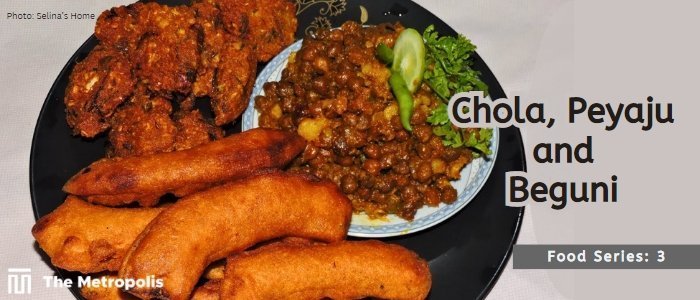Nigar Sultana –
Chola, Peyaju, and Beguni are three popular snacks in Bangladesh. These appetizers hold a distinct position in the nation’s culinary tradition in addition to being delicious. During Ramadan, the Muslim holy month of fasting, they are a very popular snack. Muslims break their fast throughout this month with this trio.
Chola is a spicy snack made from boiled chickpeas. Every age group in Bangladesh enjoys this common street food. The chickpeas are first boiled until they are soft before being used to make Chola. After that, they are cooked with chopped green chili, onion, and coriander leaves. To improve the flavor, some people also add boiling potatoes and eggs.
The history of Chola dates back to ancient India when chickpeas were first cultivated in the Indus Valley. The dish was first mentioned in ancient Sanskrit texts, which describe a similar dish made from split chickpeas. Additionally, Chola is listed in the Ayurveda, an ancient Indian medical system, where it is regarded as a wholesome and nourishing diet. Over time, it spread to other parts of India and eventually to Bangladesh and other South Asian countries. It is believed that the dish was first prepared by the Bengali community during the reign of the Nawabs of Bengal.
Peyaju, also known as Pyazi, is a deep-fried snack made from onion and lentil batter. The name “Peyaju” comes from the Bengali word for onion, “Peyaj”, which is one of the key ingredients in the dish. In Bangladesh, it is a well-liked tea-time treat, and many restaurants also serve it as an appetizer. Finely sliced onions, soaked and ground lentils, green chili, coriander leaves, and spices are combined to make Peyaju. The mixture is subsequently deep-fried in hot oil until crispy and golden.
Peyaju’s origin can be found in the Mughal Empire, which ruled over a large portion of South Asia from the 16th to the 19th century. Deep-frying was one of the culinary techniques that the Mughals introduced during this time. It is thought that Peyaju was created at this time and was influenced by both Mughal and local Bengali cuisine.
Beguni is a crispy snack made from deep-fried eggplant slices. The name “Beguni” comes from the Bengali word for eggplant, “Begun”. It is a common street food that is frequently served with Chola and Peyaju. Slices of eggplant are first dipped in a batter comprised of chickpea flour, salt, turmeric, and chili powder before being prepared as Beguni. After that, the slices are deep-fried in hot oil till crispy and golden brown.
The origins of Beguni are not entirely clear, but it is believed to have been influenced by the Mughal cuisine of the time. During the Mughal period, eggplant was a common ingredient in numerous recipes. With time, eggplant established itself as a key component of Bengali cuisine and started to gain popularity as a snack item.
Along with being delicious, Chola, Peyaju, and Beguni provide a number of health advantages. The main component of Chola, chickpeas, is a plentiful source of protein, fiber, and a number of vital elements, such as iron, magnesium, and vitamin B-6. The main component of Peyaju, lentils, is also a good source of protein, fiber, vitamins, and minerals like iron, potassium, and B-6. The major component of Beguni, eggplant, has few calories but is rich in fiber, vitamins, and minerals like potassium, vitamin C, and vitamin K.
The cultural impact of Chola, Peyaju, and Beguni extends beyond just food. These meals are now an integral part of Bengali culture and are frequently served during traditional celebrations and festivals. They are a beloved snack among people of all ages and a significant component of Bengali street food culture.
There are a number of reasons why Chola, Peyaju, and Beguni are so popular. First of all, they may be created using basic components that are easily found in most kitchens and are quite straightforward to prepare. They can be a pleasant substitute for more expensive snacks and appetizers and are also quite inexpensive. Finally, these foods have distinct, excellent flavors and textures. In Chola, Peyaju, and Beguni, the mixture of spices and herbs is utilized to produce a special flavor profile that is both spicy and savory.
These foods have influenced a wide range of facets of popular culture. For instance, uploading images of Bengali cuisines, such as Chola, Peyaju, and Beguni, by food vloggers and Instagram influencers have become increasingly popular in recent years. certain articles have broadened the appeal of certain foods and served to make them more well-known.
Additionally, Bengali eateries have grown in popularity all over the world, and many of them focus on serving traditional Bengali delicacies like Chola, Peyaju, and Beguni. For food lovers seeking to sample the distinctive flavors of Bengali cuisine, these eateries have grown to be a favorite destination.



